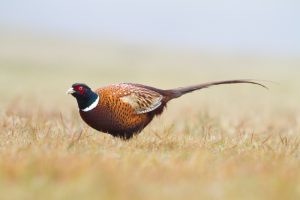Short answer
The average lifespan of a Pheasant is around 2 to 3 years.
Life expectancy
The average lifespan of a pheasant varies depending on several factors such as species, habitat, and predation. In general, wild pheasants have an average lifespan of 2 to 3 years. However, some species, like the common pheasant, can live up to 5 years in the wild. Pheasants in captivity, under optimal conditions, have been known to live as long as 10 years or more.
Various factors contribute to the relatively short lifespan of wild pheasants. Predation plays a significant role, as pheasants are preyed upon by a variety of animals including foxes, coyotes, raccoons, and birds of prey. Additionally, pheasants face challenges such as competition for food, habitat loss, and exposure to harsh weather conditions. These factors, coupled with the natural mortality rate, contribute to the shorter average lifespan of wild pheasants.
On the other hand, pheasants kept in captivity tend to have longer lifespans. When provided with proper care, a nutritious diet, and protection from predators, pheasants can thrive and live longer. The average lifespan of captive pheasants can range from 5 to 10 years, with some individuals even surpassing 10 years. However, it's important to note that the lifespan of captive pheasants can still be influenced by genetics, diseases, and other environmental factors.
Overall, while the average lifespan of pheasants is relatively short, the individual lifespan can vary depending on various factors. While wild pheasants typically live for a few years, captive pheasants can enjoy a longer lifespan when provided with appropriate care and protection. Understanding the average lifespan of pheasants can help in conservation efforts and decision-making regarding their management and protection in the wild.
Some interesting facts about Pheasant
- Pheasants are beautiful birds known for their vibrant plumage and long, sweeping tail feathers.
- The males, called roosters or cocks, have strikingly colorful feathers, with a distinctive metallic sheen. In contrast, females, known as hens, have more modest plumage for camouflage.
- Pheasants are primarily found in Asia, but they have been introduced and naturalized in many other parts of the world, including Europe, North America, and Australia.
- The most common species of pheasant is the ring-necked pheasant (Phasianus colchicus). This species is famous for its bright neck ring and is widely hunted as game birds.
- Pheasants are omnivorous birds, feeding on a varied diet that includes seeds, grains, insects, and small reptiles. They have a preference for agricultural fields, where they can easily find their preferred food.
Summary
Pheasants generally have a lifespan of around 3 to 4 years in the wild, with some living up to 6 years. However, in captivity, their lifespan can extend to around 10 years. Factors that affect a pheasant's lifespan include predation, habitat quality, disease, and availability of food and water. While they may not live as long as some other bird species, pheasants can still thrive and contribute to their ecosystems during their relatively short lives.




